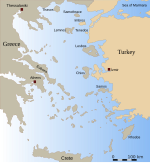Gyaros
This and other small islands of the Aegean Sea served as places of exile for important persons in the early Roman Empire.[2] The pseudo-Aristotelian work On Marvellous Things Heard (25) recounts the tale that on Gyaros the mice eat iron.[9] The Roman poet Juvenal, a near-contemporary of Tacitus, mentions this island twice in his Satires: first as a place of exile for particularly vile criminals (1.73), and second as a symbol of claustrophobic imprisonment (10.170).Under emperor Nero, the philosopher Musonius Rufus was found guilty for his participation in the Pisonian conspiracy and was banished to Gyara.The island is currently off-limits to the general public except during commemorative events and approaching or fishing in close proximity is forbidden by the Hellenic Coast Guard.
CycladesRegionSouthern AegeanRegional unitArea code(s)Vehicle registrationGiouraAndrosAno SyrosAegean SeaRoman EmpireTacitusJuvenalprison islandconcentration campleft-wingmonk sealsOn Marvellous Things HeardAeneidVirgilMykonosApolloAegeusStraboCorinthPliny the ElderNatural HistoryCiceroSilanusproconsulprovince of AsiaRoman SenateRoman EmperorTiberiusKythnosAmorgosSatiresAlexander the GreatSeriphosMusonius RufusPisonian conspiracyInternal exile in GreeceGreek ResistanceEthniko Apeleftherotiko MetopoGreek Civil WarJehovah's Witnessesconscientious objectorsGreek military juntaHellenic NavyHellenic Coast GuardWayback MachineNereidsNeptunebow-bearing godMyconosKnossianPrehistoric timesAnnalesparricideGreeceTurkeyAegean civilizationsAegean disputeAegean IslandsGreek islandsTurkish islandsAnanesAntimilosAntiparosDaskalioDespotikoDonousaFolegandrosIrakleiaKardiotissaKimolosKoufonisiaPolyaigosRineiaSantoriniSchoinoussaSerifopoulaSerifosSifnosSikinosTherasiaDodecaneseAgathonisiAlimiaArmathiaAstypalaiaÇataladaFarmakonisiKalolimnosKalymnosKara AdaKarpathosKinarosKüçük Tavşan AdasıLeipsoiLevithaNisyrosPatmosPserimosRhodesSalih AdaTelendosZaforasNorth AegeanAgios EfstratiosAgios MinasAmmoulianiAyvalık IslandsBüyük AdaChryseFoça IslandsFournoi KorseonIcariaImbrosKoukonesiLemnosLesbosMegalonisiMetelik IslandOinoussesSamiopoula